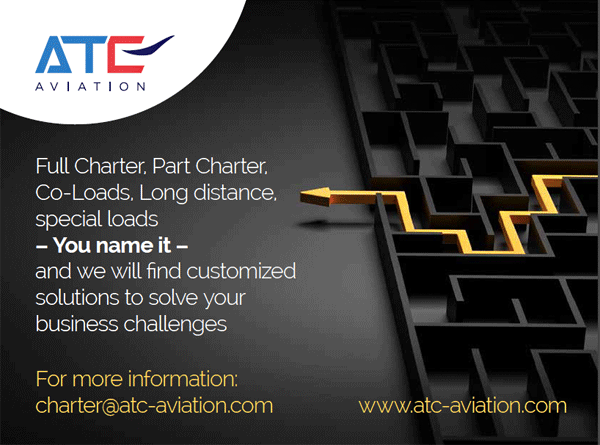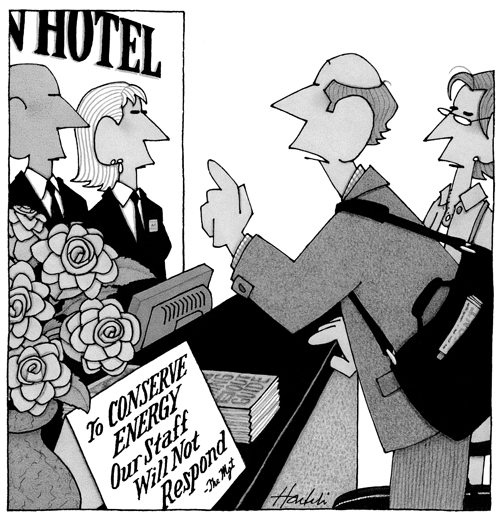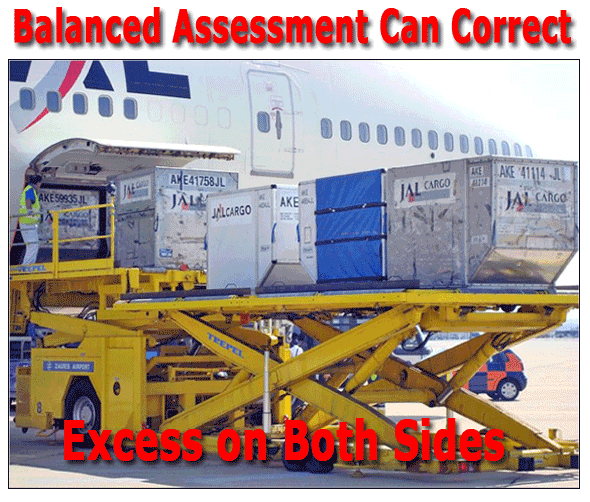 |
Regarding Air Cargo Pallet availability,
a perfect storm is approaching: this is the conclusion
of a relatively brief read published by our good friend Bob Rogers. He
states that “for a good many months the air cargo community has
been struggling with the demand for PMC pallets to handle the significant
increase in air cargo volumes. There are a number of reasons behind this
critical operational shortage and the main solution has been for airlines
to buy or rent additional equipment.”
On the other hand, we also hear that we
are fast getting back to the belly-hold capacity we used to observe in
pre-COVID times, but the appetite for freighters is not diminishing. Considering
the kind of specialised equipment, there is only a certain amount of capacity
that airlines can add by just buying or renting additional equipment and
this is not the only element at play in this conjure.
Our friend Bob Rogers argues that things
are “probably about to get significantly worse as we have three
negative factors coming together to create a perfect storm.” The
cost of raw material has roughly doubled and is about 80% of the cost
of a new PMC (see below).
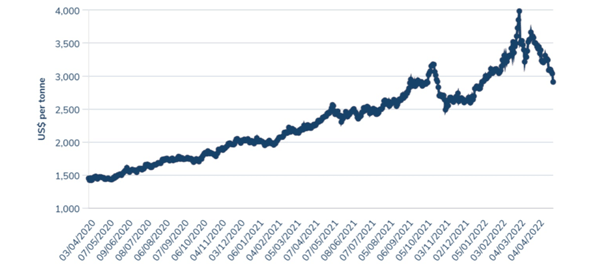 |
Even if you are prone to readily part with
the money necessary to subsidize the increase, that is no fix to satisfy
the hungry shippers’ community: Bob Rogers observes that “there
are only a handful of rolling mills in the entire world capable of rolling
the high strength aluminium alloy sheet used in the manufacture of air
cargo pallets to a width of 96 inches. Such high width sheet has only
a few applications and hence there are only a limited number of rolling
mills with this capability. And here is the problem, the four rolling
mills are located in China (two), one each in the USA, and Russia. With
the Russian rolling mill now embargoed, the question is whether demand
can be met from these other facilities, this is an unknown at the moment.”
In addition, the already scarce supply of
aluminium will become the battlefield for other customers: these rarefied
sheets will also be used for the fabrication of main and lower deck containers
for express cargo and e-commerce further affecting the supply of pallet
sheet available for PMC.
All this being said, there is a legitimate
question that can be asked: with an estimate of 400,000 PMC in circulation
in the air cargo industry why is there a problem? ULD CARE have published
their White
Paper identifying the longstanding habit of not charging demurrage
in air cargo as the reason why efficiency is lost. ULD CARE argue that
freight forwarders do not have any incentive in using the equipment immediately
and returning it swiftly to the airports following the breakdown of the
cargo, as the idle time spent at their premises is not charged. ULD CARE
also suggest a number of pieces of equipment are returned with five or
more days’ delay, and maintain the opinion that one of the low hanging
fruits on this tree is the issue of lag times in the return of empty equipment
from freight forwarders. We read the data collected by ULD CARE: “from
a representative group of airlines we believe that between 20 to 25,000
empty PMC are overdue for return by 5 or more days.” ULD CARE argue
that “this is perhaps unsurprising given that, with the exception
of a couple of airlines, there are currently no kind of financial penalties
for late return of equipment, it is left entirely up to the convenience
of the forwarders to put these PMC back into circulation. The days of
treating PMC pallets as just a convenient means of building up cargo,
to be treated without much in the way of responsibility by the various
players in the cargo chain are now behind us.”
These are somewhat strong statements that
need to be taken with a grain of salt and with the perspective of balance.
In their White Paper ULD CARE tell us that “this practice runs contrary
to the International Air Transport Association’s (IATA) documentation
that sets the industry standards for aviation: IATA’s Air Cargo
Tariff and Rules Manual (TACT) under Section 4.8 - Unit Load Device Charges
stipulates that “demurrage charges may be levied, subject to provisions
in applicable tariffs of the airline or ULD owner, against a party that
retains a ULD for an excessive period of time. The charge is designed
to encourage prompt return of ULDs rather than generate revenue.”
And then ULD CARE further argues that evidence exists to show that air
cargo adopts a profoundly different approach as compared to containerised
shipping industry: “We asked those involved in the ULD management
process why, not charging demurrage for off-airport build-up and breakdown,
is acceptable. The responses indicated that there were several prevailing
points of view, which included: airlines’ fears of losing their
customer to someone who doesn’t levy such charges; a lack of an
efficient system to track the transfers and times, and therefore fees;
and a questionable legal justification for charging demurrage.”
Details of these and other reasons given by respondents in research carried
out in Q4 2021 by ULD CARE can be found in Appendix 3 - Why are airlines
reluctant to charge demurrage for their ULD?
Further along, the document argues that
“there seems to be no direct equivalent in the maritime industry
to the ‘asset management’ operations in the air cargo industry,
e.g. ACL, Jettainer and Unilode. However, at the end of the day, someone
has to pay for inefficiency. Even if the airline has outsourced its ULD
operations to a third party, that doesn’t mean that shippers can
delay return of the ULD. Ultimately, this will add to the cost of operation
for the airline in loss of utilization, and the cost of additional ULDs.”
In other words, part of the explanation for some of the inefficiency could
come from the airlines’ excessive tendency to outsource bigger and
bigger parts of their business. And one could also argue (and some actually
do) that these unwanted consequences entailing from an exaggeration in
outsourcing are just part of the issue, whilst one could counter argue
that were it not the case, there would be no airlines as such in operation
today to talk about. This could become a never ending and pointless discussion.
In reality the practice of dealing with air cargo outside of the airport
sites is now almost universal and it has grown in the last 4-5 decades
in parallel to the air cargo expansion, and these choices made more than
half a century ago strongly reverberate today in our daily business. It
is really difficult to even remember how the business was industrialised
over half a century ago.
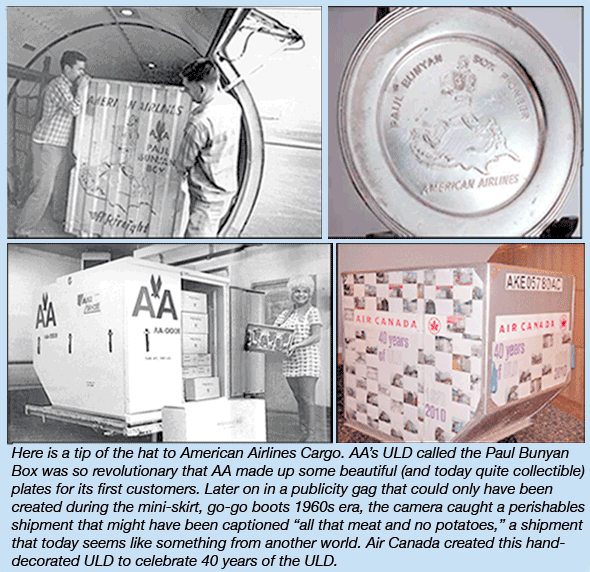 |
ULD CARE rightfully observe that “the
early days of air cargo did not involve containerization - all cargo was
handled in bulk. ULDs were introduced with the advent of wide-bodied aircraft
in the early 1970s. Since then, ULD have become indispensable to the efficient
movement of air cargo and baggage around the world with a current estimated
global fleet of 900,000 units. The practice of airlines providing ULDs
to freight forwarders and even shippers to build up or break down cargo
consignments (known variously by terms such a pre-pack, shipper pack,
shipper loaded, etc.) has gained popularity over the past 50 years.”
But they also contend that “the reality is that an airline cannot
operate an efficient air cargo operation when 5 to 10% of their freight
equipment assets are not available at any given point in time.”
However, this idea that 5 to 10% of the
equipment should be available at any given time to ensure efficient and
smooth operations appears a bit far-fetched, if not finally naïve.
In many industries 5 to 10% buffer capacity in asset management is considered
a bare minimum to ensure efficient operation. In what many called “the
excesses of JIT” that we experienced in recent years with inventory
reduced to the bare bone, some observers argued that this practice was
not entirely healthy. COVID-19 taught us all some severe lessons in this
regard. Today many start thinking that a balanced approach seems to be
the right one. Nobody should keep excessive stock, but on the other hand
nobody should start painting the big picture with just enough colours
to get to the last stroke. An unfinished picture could be the result…
The comparison with the maritime industry
continues in this document that we are digesting and there comes a significant
appraisal: “a single PMC pallet, the most common type of ULD and
the workhorse of the air cargo industry, will move about 7 times a month,
or close to 100 trips a year. Each of these trips generates revenue for
its owner airline, the amounts varying according to the actual sectors
flown. Compare this to ocean freight equip¬ment, on which demurrage
is universally charged, where a typical container makes around 5 trips
per year.” So the argument is: where demurrage should cost less
it is universally (almost) charged, but where it should cost much more
it is almost never charged. Maybe we could also ask ourselves if charging
demurrage in proportion with the alleged cost of these movements could
actually speed operations or not. At a certain point of the comparison
with the shipping industry we land on firm ground by stipulating that
“the application of a demurrage charge for late return is in the
interests of all parties to rectify the situation as increased utilization
may very well result in greater efficiency and lower cost for shipping”,
but in my view the comparison is not always truthful: these are two industries
which both play with transit times, but their individual game is substantially
different. Operators that use aircraft are ready to pay a premium cost
for the service by air that they would never allow in waterborne transport.
Rail transport, when it is possible, stays in the middle. Different modes
have some analogies and some profound, well rooted differences. In my
personal opinion it is legitimate to compare the two and the observation
of their similarities and differences offers good lessons, but it does
not tolerate a quick jump to conclusions.
My view is that air cargo is reasonably
efficient as is, considering the variety of actors and stakeholders at
play. I remember many years ago, when I was still employed in the sector,
we had calculated that air cargo was sitting idle for something like 74%
of the total transit time and Customs was the main culprit in that –
now outdated – literature. This appeared to be shocking at the time,
but when you consider the complexity of the many-to-many relationships
that lead to the air cargo movement, this merely appeared to us as a territory
where a lot of improvement could be made, but no prisoners should be taken.
Much of the improvement in the last few
years has been due to more advanced technology and much of the improvement
that did not come to fruition appeared to be due to the inability to consistently
adopt new, more efficient technology across the supply chain. However,
you need a fair degree of ingenuity to expect such changes to become available
quickly and universally. After reading the documents produced by the G7
initiative in the 1990’s I was young and hopeful that universal
paperless transactions could become commonplace before the end of the
millennium. In the many years I spent discussing these issues with many
governmental and non-governmental organisations at different levels, I
came to the conclusion that universal is a very complicated word to use
when you deal with so many variables. We must realise that little of what
we had expected then has become available in reality, and there is so
much that got lost somewhere in the pipeline.
The White Paper however sees that “these
new developments in technology are making the possibility of an automated
tracking and transfer platform [for ULD equipment] more realistic. However,
the elements fundamental to an effective demurrage system in air cargo
have always existed. The application of that system is where the industry
has fallen short and, at this point, technology may not solve the issue
if the asset owners do not enforce demurrage rules.” The document
further suggests that “Nobody likes to pay a fine or a penalty,
but this can be made far less painful with the intelligent application
of technology. For airlines to enjoy these benefits requires that:
•
There be an industry level acceptance that demurrage for ULD be
a standard practise.
•
That a single common platform be established to process ULD transfer
transactions, avoiding a multiplicity of airline-by-airline approaches,
offering transparency to shippers and delivering a pain-free process for
all involved.”
The grounds for it appear to be there (and
yet they go undisturbedly forlorn), as you read in the IATA TACT Manual
here.
I must however say that consulting IATA’s
website in this section does not provide the clarity and straightforwardness
that one would wish for. Universal acceptance seems a bit far in this
regard.
At the same time ULD CARE seeks the active
engagement of the three major industry trade associations to support the
acceptance of the practice of demurrage across the entire air cargo industry,
and will seek to actively engage with these bodies to achieve this goal.
In so doing ULD CARE read Fiata’s
statements (2018) as to be pronounced in favour of charging demurrage
in the air cargo domain.
Let me go straight to the point, as I have
been involved with FIATA so many years. Obviously FIATA cannot write that
they like demurrage and detention to be charged or, as the case may be,
not charged, because that is actually none of its own choice. FIATA recommends
a balanced approach in this area and warns the enthusiast that this may
become complicated, in particular when balance is lost: “demurrage
and detention charges are intensely disliked by customers using maritime
transport and should be avoided whenever possible. This guide identifies
the legitimate reasons why charges can be incurred but further explores
situations where charges can be minimised or avoided.” It is a clear
statement and it actually throws the ball back onto the pitch: there could
be several ways to improve efficiency without necessarily relying only
on the efficiency injected by a charging policy. In addition, I dare say
FIATA deals with maritime demurrage and detention, in a situation where
liners have been found to have several venial and capital sins to atone
for. FIATA never actually unilaterally raised the issue of demurrage and
detention in air cargo and probably would not appreciate being identified
as the main target of any such measure in the industry. What FIATA writes
(with regard to maritime) is the following: “FIATA respects that
demurrage and detention charges are valid and important tools for shipping
lines to ensure that their equipment is being returned as fast as possible.
Merchants exceeding relevant free times should be penalized for the use
of the container” as noted by ULD CARE, but the statement continues
with this observation: “However, merchants should not be subjected
to unjust and unreasonable charges. In this context, there are strong
indications that shipping lines abuse the charging of demurrage and detention
to maximise profits. It is understood that shipping lines have been suffering
in a very tough business environment and do everything they can to develop
revenue streams that are not necessarily derived from freight, but FIATA
does not believe that merchants should be subjected to predatory pricing
of this nature, especially as delays often occur through no fault of the
merchant.” In other words, when demurrage and detention is usually
charged, the temptation to use these fees to generate revenue (against
IATA’s expressed intentions) may become too strong to resist.
Fact is some liners have been found responsible
of unfair and sometimes reckless behaviour in quite similar circumstances.
Some of these issues have been discussed at different levels with competition
authorities and maritime commissioners. In FIATA’s recent Headquarters’
meeting in May an exceptionally high level discussion panel saw Commissioner
Rebecca F. Dye, U.S. Federal Maritime Commission, share her views together
with her counterparts from China, the EU and the African Union; it was
an elegant debate discussing the topic of fairness in maritime contracts,
but it also included an ample section regarding demurrage and detention.
I personally listened to the discussion and I must underline the extreme
professionalism of Commissioner Dye, who came straight to the point both
in her speech and during the Q&A, announcing some of the measures
that had been adopted by the U.S. administration.
I confess I did not find the same approach
in all the other speakers and in particular I was perplexed in listening
to the EU representative’s statements, who appeared to be stuck
to the “there is no evidence” approach. Commissioner Dye instead
was extremely precise in describing the circumstances where evidence might
be absent for certain reasons, even the fear of possible retaliation.
In her approach the fact that evidence could
hardly be brought to the table of the Commission to initiate its investigation
was clear, as clear was the fact that the EU would not take an interest
in any of this, unless strong evidence of wrongdoing was hitherto brought
to its table and such evidence could then stand the EU Commission’s
scrupulous scrutiny.
Fortunately, the FMC actually adopted measures
meant to overcome the questions brought to the table in FIATA’s
discussion, whilst FIATA published an agile toolkit for the benefit of
its members in need, where one could read the following statement: “the
FMC also concluded that whether commercial arrangements are lawful is
the point. Ocean carriers and marine terminal operators (and ocean transportation
intermediaries) do not have an unbounded right to contract for whatever
they want. They are limited by the prohibitions of the Shipping Act, one
of which is § 41102(c) i.e. being just and reasonable. Ocean carriers
and marine terminal operators do not have an inviolate right to contract
with their customers free from government scrutiny, and there is reason
to question whether demurrage and detention practices are normally the
subject of arms-length negotiation between parties with remotely equal
bargaining power. This is not to say that shippers and intermediaries
do not negotiate certain aspects of demurrage and detention, such as free
time, in service contracts. But many, if not most shippers lack significant
bargaining power as compared to ocean carriers.” This is a statement
that says it all.
Coming to the end of this long reflection
on the opportunity, or requirement to charge demurrage and detention for
ULD in airfreight operations, I think the question of balance is delicately
important. Whether commercial arrangements such as demurrage and detention
charges are lawful is indeed the point, as the FMC stipulates. My conclusion
is that it may be adequate and appropriate to charge demurrage when sufficient
free time has been allocated, whilst at the same time sufficient is an
adjective whose meaning should include an assessment of the type of operations
to be performed, if the use is one way only or it implies, as many would
wish, the reuse of the unit on the way out, the distance covered and the
circumstances of the regulatory system where the transaction takes place,
etc. In the maritime we have seen very often an unreasonable attempt to
write down rules that respond to the principle of one size fits all, when
we know only too well that in logistics this often tends to become a systemic
inefficiency.
If we wish to address this estimated and
yet to be demonstrated 5 to 10 percent inefficiency, we must be quite
sure that we use a balanced and fair assessment, where everyone must have
a voice, and we are not inventing measures that could lead to other problems
and even greater inefficiencies.
Marco Sorgetti |
